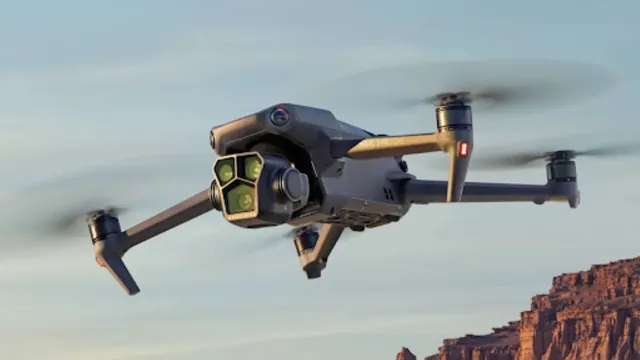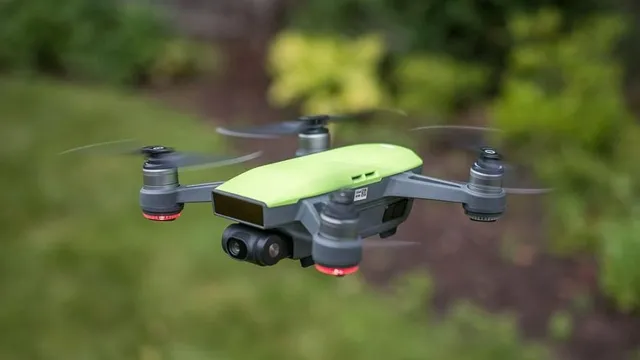Have you heard about the DJI Drone Ban? Recently, DJI, one of the leading drone makers, has come under fire due to security concerns in the U.S. market.
In response, the Department of the Interior temporarily grounded the use of all non-emergency drones, which includes DJI drones, until a thorough review of potential security risks is conducted. While DJI drones have been popular for their high-quality camera capabilities and ease of use, the ban has caused confusion and concern for drone enthusiasts and professionals alike. Let’s take a closer look at what this ban means and why it’s important to understand the situation.
History of DJI Drone Ban
DJI drones have been banned in various countries due to privacy and security concerns, but the most notable ban was imposed by the United States Government. In 2017, the US Army banned the use of DJI drones over concerns regarding vulnerabilities in the technology that could be exploited by unauthorized parties to gain access to sensitive data. This came as a huge blow to DJI as the US Army was one of their biggest customers.
In response, DJI released a firmware update that removed many of the security vulnerabilities that were identified by the US Army. However, the ban has remained in place despite these changes, and other countries such as Australia and Japan have followed suit in imposing restrictions on the use of DJI drones in certain areas. Despite these setbacks, DJI remains one of the most popular drone manufacturers globally and continues to innovate and release new products.
US Government Concerns about DJI Drones
DJI drone banIn recent years, the US government has raised concerns about the use of DJI drones. The Chinese technology company has faced several restrictions and bans from government agencies due to fears of potential national security threats. In 2017, the US Army prohibited the use of DJI drones due to cybersecurity concerns.
Later, in 2019, the Department of the Interior grounded its entire drone fleet, citing similar security concerns. The Federal Aviation Administration has also banned the use of certain DJI models in sensitive locations. However, DJI maintains that it is committed to maintaining the security of its products and has implemented measures to address the US government’s concerns.
Despite this, the uncertainty surrounding DJI’s use in government operations remains an ongoing issue. As the debate around drone technology’s security and potential risks continues, it remains to be seen whether DJI can address these concerns and gain the trust of the US government.

DJI’s Response to the Ban
DJI, Drone BanDJI, the world’s largest commercial drone manufacturer, has faced a ban in the United States over security concerns. The ban was initiated in 2017 by the US Army, and later extended to include all US government departments. The concerns raised related to DJI’s drones transmitting data to China, which raised security concerns among government officials.
DJI has since responded to the ban, arguing that it is a victim of geopolitics and that its drones are secure. The company has also pointed out that the data collected by its drones is stored locally on the drone and does not automatically transmit to China. DJI has since implemented new measures to ensure the privacy and security of its users, including the use of local data storage and the implementation of firmware updates to address potential vulnerabilities.
Despite these efforts, the ban remains in place, and DJI continues to face scrutiny from US government agencies.
Impact of DJI Drone Ban on Consumers and Businesses
The recent DJI drone ban has disrupted the drone industry, impacting both consumers and businesses. The ban has created uncertainty for drone buyers who may have planned to buy DJI drones for personal or professional use. For businesses, the ban has led to a shortage of DJI drones, hindering their operations.
On the other hand, some companies have turned to alternative drone manufacturers, trying to fill the void left by DJI. Consumers are also considering alternative options such as Autel Robotics, which has seen an increase in demand. The DJI drone ban has also sparked conversations about data privacy and security, as some authorities are concerned about DJI’s data-sharing practices.
While the initial impact of the ban remains unclear, the drone industry is continuously evolving, and it will be interesting to see how these events will shape the market in the long run.
Consumer Perspectives on DJI Drone Ban
The recent ban on DJI drones has left both consumers and businesses grappling with significant uncertainties. Many drone enthusiasts and professionals in the cinematography industry are concerned about the impact this ban could have on their livelihoods. With DJI’s dominance in the drone market, finding a comparable replacement with the same features and quality is challenging.
Additionally, the ban could result in price hikes for drones, making them unaffordable for those who rely on them for work or pleasure. On the other hand, some people support the ban, citing concerns related to data privacy and national security. Regardless of personal opinions, the DJI drone ban remains a double-edged sword for the industry.
While it may address valid security concerns, it also carries significant economic implications for drone lovers and businesses alike.
Business Perspectives on DJI Drone Ban
The recent decision by the US Department of Commerce to add Chinese drone maker DJI to its trade blacklist has sent shockwaves throughout the drone industry. While this move has been seen as a triumph by DJI’s competitors in the US, the ban is expected to have far-reaching consequences for consumers and businesses alike. For consumers, this means losing access to some of the most advanced and affordable drones on the market.
Meanwhile, businesses that rely on DJI’s drones for their operations will have to find alternative solutions, which can be costly and time-consuming. With DJI’s dominance now threatened, there is also the possibility of the industry becoming more fragmented, which could lead to further confusion and uncertainty. All in all, the DJI drone ban is likely to have both short-term and long-term impacts on the drone industry as a whole.
Alternatives to DJI Drones
Following the recent ban on DJI drones by the US government, consumers and businesses are left in a state of uncertainty, as they seek out alternatives to the world’s leading drone manufacturer. While this has undoubtedly disrupted the drone market, it has also opened up opportunities for competitors to step in and fill the gap. One such alternative is the Autel Robotics EVO II, which packs advanced features such as obstacle avoidance and 8k video capture, making it an excellent option for professionals and enthusiasts alike.
Another contender is the Skydio 2, which boasts cutting-edge AI and tracking capabilities, making it an attractive choice for filmmakers and photographers. However, it’s worth noting that many drone enthusiasts still rely on DJI’s products because of their superior technology and versatility. Regardless, the ban has sparked interest in new drone models and has encouraged more competition and innovation in the market.
Predictions for the Future of DJI Drone Ban
The DJI drone ban has created a lot of uncertainty in the drone industry, with many people wondering what the future holds for drone enthusiasts and professionals alike. While the ban has caused some inconvenience for those who rely on DJI drones for their work, there are also many who believe that it is a necessary step to protect national security. As we move forward, it is likely that we will see more regulations and restrictions being put in place for the use of drones, especially in sensitive areas such as airports and government buildings.
However, it is also possible that we may see more leniency in other areas, as drone technology continues to evolve and become safer and more efficient. Ultimately, the future of the DJI drone ban will depend on a number of factors, including political and technological developments, as well as the overall perceived threat level of drones in the eyes of policymakers and the public. For now, it is important for drone users to stay informed and to stay up to date with the latest regulations and guidelines, so that they can continue to operate their drones safely and responsibly.
Impact of New Regulations on DJI Drones
The impact of new regulations on DJI drones has been a major concern for drone enthusiasts, hobbyists, and professionals alike. The recent ban on DJI drones by the US government due to security concerns has left many wondering about the future of the company. However, predictions for the future of DJI drone ban seem to indicate that the ban may not be permanent.
Many believe that DJI will work to address the security concerns raised by the government and come up with a solution to regain the trust of their customers. Additionally, DJI is a well-established company and has a loyal following, which could help them bounce back from this setback. In the long-term, the ban may lead to more robust drone regulations, but DJI is likely to remain a dominant player in the drone market.
As always, it’s best to keep an eye on future developments and invest in DJI products accordingly.
Implications for DJI’s Competitors
As the DJI drone ban continues to impact the market, competitors in the industry are closely watching to see how it may affect their own businesses. Some predict that this ban could lead to increased demand for alternative drone providers, as consumers look for substitutes for DJI products. Other industry leaders may seek to capitalize on DJI’s current setback by investing in cutting-edge technology and ramping up production to meet the growing demand.
However, it remains to be seen whether DJI’s competitors will be able to take advantage of the opportunity presented by this ban, or whether DJI will eventually find a way to navigate these restrictions and retake its position as a leading drone manufacturer. Regardless, the landscape of the drone industry is likely to shift in the wake of this development, with new possibilities and challenges emerging for all players in the market.
Conclusion: What to Expect from DJI Drone Ban
In conclusion, the DJI drone ban is a reminder that technology has its limitations and responsibilities. While drones may offer us incredible advancements in aerial photography and videography, we must also consider the potential risks and consequences they pose. By understanding the importance of safety, privacy, and regulation, we can work together to create a future where both drones and humans can thrive.
Or, to put it simply: fly your drone responsibly, or you may find yourself grounded.”
FAQs
What is the DJI Drone ban?
The DJI Drone ban refers to restrictions imposed on the use of drones made by DJI, a Chinese drone manufacturer, by some countries and government agencies due to security concerns.
Which countries have banned DJI Drones?
The United States, Australia, and the United Kingdom have banned the use of DJI Drones in some government agencies due to security concerns.
Why are DJI Drones banned in some countries?
The primary reason behind the DJI Drone ban is concern over the potential for the drones to be used for spying and data collection by the Chinese government.
Can individuals still use DJI Drones in countries with a ban?
In most cases, individuals are still able to use DJI Drones in countries with a ban. However, they may face more regulatory restrictions and may be required to obtain special permits or licenses.
